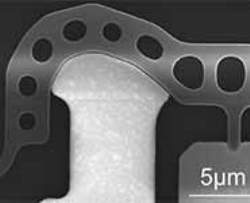Using a €2.44 million European Commission grant, a collaborative consortium aims to develop a first-of-its-kind fully functional nano-electro-mechanical (NEM) relay-based processor with unprecedented energy efficiency.
 "Curved cantilever design for a robust and scalable microelectromechanical switch," in Proc. 56th Int. Conf. Electron, Ion, and Photon Beam Technology and Nanofabrication, Hawaii, 2012 (Image by D. Grogg et al, IBM)
"Curved cantilever design for a robust and scalable microelectromechanical switch," in Proc. 56th Int. Conf. Electron, Ion, and Photon Beam Technology and Nanofabrication, Hawaii, 2012 (Image by D. Grogg et al, IBM)
This level of energy efficiency is not possible by transistor implementations because of limitations in basic material and structure. This puts a ceiling on the use of transistors in ultra-low power applications. The Nano-Electro-Mechanical Integration and Computation (NEMIAC) project will explore the NEM relay technology to develop digital integrated circuits for use in ultra-low power computing applications.
The members of the consortium participating in the project include University of Bristol, Lancaster University, École Polytechnique Fédérale de Lausanne, Royal Institute of Technology Sweden, STMicroelectronics and IBM Zurich.
Dr Dinesh Pamunuwa, In-Charge of the project’s communication and Reader in Microelectronics at the University of Bristol’s Department of Electrical and Electronic Engineering, informed that NEM relays have a high on-current, an unexpected turn-on transient, and virtually zero leakage and allow integration with CMOS at the wafer or die level, making them potential contenders for implementing digital logic in ultra-low power applications. The development of a fully functional NEM relay-based processor will enable the use of electro-mechanical switches as fundamental building blocks, which in turn will help realize a fully mechanical calculator originally proposed by Babbage 200 years ago.
The NEM logic technology’s long-term potential is to facilitate the development of ultra-low power smart systems with energy harvesting capability, thus enabling a new range of applications that operate continuously, remotely, autonomously and devoid of battery.
This work underpins IBM's vision of ‘smarter cities,’ where in-situ processing and control and ubiquitous sensing support a city’s essential infrastructure such as transport, healthcare, energy and utilities, safety and retail.